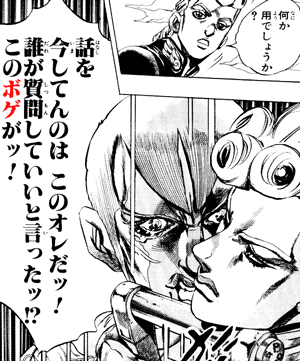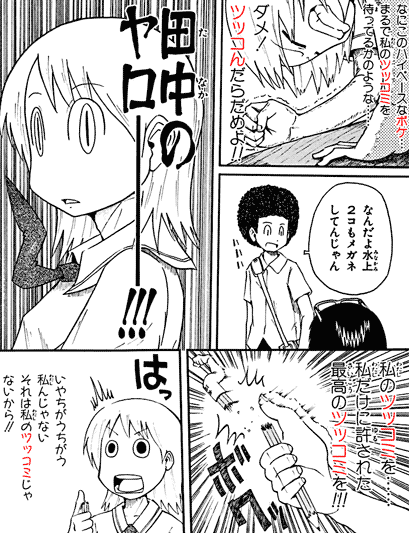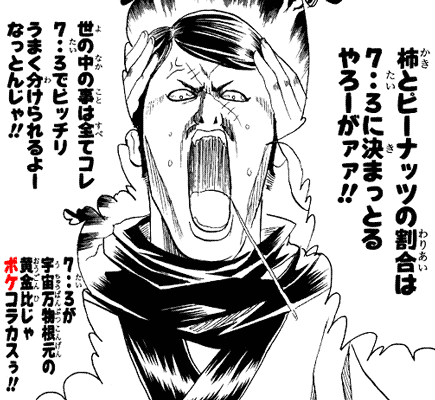In Japanese, boke ボケ means "idiot," or something stupid someone does, specially in comedy.
Meaning
The noun boke is probably related to the verb tobokeru 惚ける, meaning "to become dumb," in the sense of dim-witted, slow. As a verb, bokeru ボケる, its origin seems to be from hokeru ほける, houkeru 惚ける, which means to become absent-minded when doing a task.(デジタル大辞泉:惚ける)
In any case, boke clearly means someone is empty-headed.
manzai
In manzai 漫才, a type of comedy performed by a duo of comedians, one comedian plays dumb, by saying things wrong, getting things wrong, or doing stupid things, while the other one retorts, saying what the first one did wrong, or pointing out how stupid it was.
Every time the first comedian says something wrong or stupid, that's called a boke, and every time the other comedian retorts or questions a boke, that's called a tsukkomi ツッコミ.
Since this type of comedy always has one person doing the boke and one doing the tsukkomi, the comedians are also said to be the boke or the tsukkomi of a duo, which is short for:
- boke-yaku
ボケ役
boke role.
Someone whose role is doing the boke (playing dumb). - tsukkomi-yaku
ツッコミ役
tsukkomi role.
Someone whose role is doing the tsukkomi (retorting).
The word boke can be also be used as a verb:
- bokeru
ボケる
To do a boke.
To play dumb.
- Context: Aioi Yuuko 相生祐子 always does a tsukkomi when Minakami Mai 水上麻衣 does a boke, however, feeling this isn't a proper relationship for two high school girls to have, Yuuko decides she won't do a tsukkomi anymore, no matter what happens, prompting Mai to do even stupider boke's, like coming to school wearing two glasses, and looking for her glasses on the floor as if she had lost them while still wearing both of them.
- nani kono {hai-peesu na} boke...
なにこのハイペースなボケ・・・
What is this {high-paced} boke... - marude {watashi no tsukkomi wo matteru} ka no you na......
まるで私のツッコミを待ってるかのような・・・・・・
It's as if {[she] is waiting for my tsukkomi}...... - dame! {tsukkondara} dame yo!!
ダメ!ツッコんだらだめよ!!
[Don't do it]! {If [you] make a retort} [you lose]!! - nanda yo, Minakami
なんだよ水上
[What's wrong], Minakami. - ni-ko mo megane shite-n-jan
2コもメガネしてんじゃん
You're wearing two glasses.- shite-n-jan - contraction of shite-iru no dewanai しているのではない.
- hahaha
ハハハ
*laughs* - Tanaka no yaroo!!!
田中のヤロー!!!
Tanaka, [you bastard]!!!- See also: cat eyes.
- watashi no tsukkomi wo......
私のツッコミを・・・・・・
My tsukkomi...... - {watashi dake ni yurusareta} saikou no tsukkomi wo!!!
私だけに許された最高のツッコミを!!!
The greatest tsukkomi [that] {was only allowed to me}!!! (literally.)
- In the sense of "only I, and not anyone else, was allowed to make a retort, how dare you take that from me!"
- boku'
ボクッ
*pencil snapping.* - ha'
はっ
Hah! (her snapping back from a moment of utter jealously.) - iya chigau chigau
いやちがうちがう
No, [that's wrong, that's wrong]. - watashi-n-janai
私んじゃない
[It] isn't mine.- Contraction of watashi no janai.
- sore wa watashi no tsukkomi janai kara!!
それは私のツッコミじゃないから!!
That's not my tsukkomi!!- In this scene, Yuuko resisted the urge to do an epic tsukkomi on Mai's boke, allowing Tanaka to do a pretty weak tsukkomi on it before her: "you're wearing two glasses, hahaha."
Idiot
The word boke can also be used to call someone an "idiot" outside of manzai contexts.
- Context: how to start a conversation.
- nani-ka you deshou ka?
何か用でしょうか?
Do [you] have business [with me]?
Is there something you want?
Anything you want to discuss?
What's the matter? - hanashi wo ima shite-n-no wa kono ore da'!
話を今してんのは このオレだッ!
I am [the one] talking [right] now!- shite-n-no - contraction of shite-iru no しているの.
- {dare ga shitsumon shite}-ii to itta'!?
誰が質問していいと言ったッ!?
Who said [it] was alright {to ask questions}!? - kono boke ga'!
このボケがッ!
[You] idiot!
Expletive at Sentence End
Sometimes, boke shows up at sentence end together with other expletives when a character is shouting angry or extremely excited for some reason.
- Context: Kurogoma Katsuo 黒駒勝男 explains the perfect ratio of rice crackers to peanuts.
- Note: kakipii 柿ピー is common mixture of two snacks, kaki no tane 柿の種, which is rice cracker shaped as a "persimmon seed," and peanuts.
- kaki to piinattsu no wariai wa hichi tai san ni kimattoru yaroo gaaa!!
柿とピーナッツの割合は7:3に決まっとるやろーがァァ!!
The ratio of rice crackers to peanuts is [obviously] 7:3!! - *he gestures to his hair.*
- shichisanwake
七三分け
Seven-three-parting. The term for this parted hairstyle, and what he's talking about.
- shichisanwake
- yo no naka no koto wa subete kore, hichi tai san de picchiri umaku wakerareru yoo nattonja!!
世の中の事は全てコレ 7:3でピッチリうまく分けられるよーなっとんじゃ!!
Everything in the word is this (like his hair), [created so that] [it] can be perfectly divided into seven to three!- wakerareru yoo ni nattonja - same as wakerareru you ni natte-iru-n-da 分けられるようになっているんだ.
- An eventivization of the stative verb wakerareru, "to be able to divide," which is the potential form of wakeru 分ける, "to divide."
- hichi tai san ga uchuu banbutsu kongen no ougonhi ja, boke kora kasuu!!
7:3が宇宙万物根元の黄金比じゃボケコラカスぅ!!
Seven to three is the golden ratio of the origin of all creation in the universe, *expletives*!!
References
- 惚ける - デジタル大辞泉 via dictionary.goo.ne.jp, accessed 2021-07-02.



No comments: